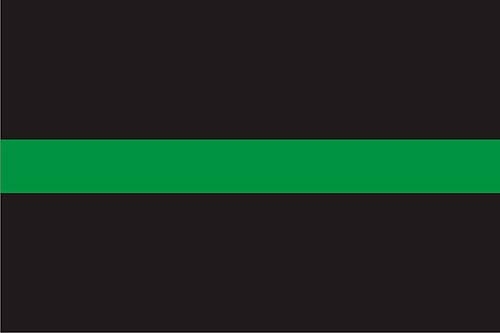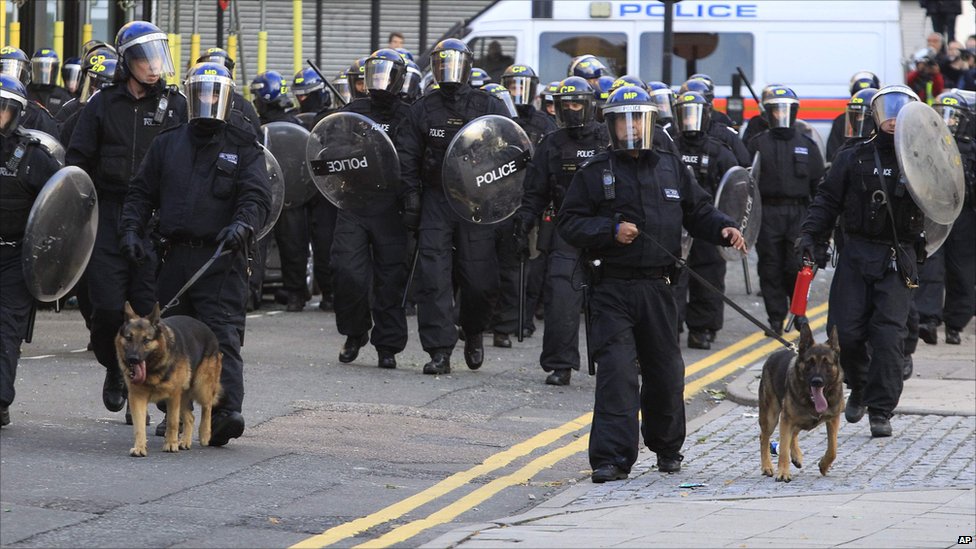"An emergency service in crisis?"
Yesterday, I read a brilliantly written blog by @NathanConstable entitled We Need to Talk About The Ambulance Service. If you haven't read it yet, please do so now, otherwise this post won't make much sense! He speaks about a lot of issues that surround the ambulance services in general and what knock on effects that has on the police. Rather than leave a long rambling comment providing my thoughts on things, I thought it would be better explained in a post of my own.

I didn't take anything that @NathanConstable wrote as a dig. It is a discussion that needs to happen, but realistically, it needs to be happening between senior figures in the police, the ambulance service, the NHS and the government. I just wish they'd listen to what we are all saying, where we are not ruled by the politics of a situation! Like Nathan says, for all the inter-service teasing and banter that goes on (and before you ask, my call sign is Whiskey Delta 4-0. Oh, and fireman, hold these fluids, good dog!) there is a mutual respect and a fantastic front line working relationship between all emergency services. We do many jobs with the fire service, some are the most traumatic of jobs we will every see. I do have a huge amount of respect for the job they do. The relationship between ambulance and police is a stronger bond, born from the huge amounts of jobs that we do together. As detailed in 'A Special Relationship' I, along with the rest of the profession, hold the police in the highest regard.
My first thoughts when I read 'The Ambulance Service is broken' was agreement. I nodded my head as I thought about what was wrong with the ambulance service. However, the more I read on, I came to a very different conclusion. Despite its failings with the relatively small things we moan about on a day to day basis (missing kit, hours, breaks, working conditions, pay bands etc), on the whole, I think the Ambulance Service is far from broken and I'll do my best to explain why.
I can't argue with the fact that police are having to wait longer and longer for us. They do. Nathan gave 4 examples of waits he's encountered, but I'm sure he could list another 20 or so without any trouble. And that is probably only the last month or so! I also wouldn't struggle to list the police jobs that I have been cancelled on! THAT frustrates me. I know if I ask for the police, if there is a unit available, they will come. Far too often, we are cancelled for a 'higher priority' knowing full well that police will have to start the wait again. The problem however, I don't believe is caused by the ambulance service alone. It's caused by triage, call rate and hospitals. I'm not saying the ambulance service is totally blameless but it does feel from a front line perspective, that we are being pulled from all sorts of different places, meaning we can no longer function as an emergency ambulance service. Whilst police wait and wait and wait for us, on thing is for sure. Someone else is waiting to!

So, hospitals. Nathan documented seeing 5 ambulances sat at the hospital due to lack of capacity. Well from experience, I'd say he caught them on a good night! Only last week I was stuck at a hospital with 13 waiting ambulances due to a lack of capacity inside. There were patients who could walk and who eventually went to the waiting room but the nurse in charge wouldn't take the hand over, so therefor we couldn't leave. This BBC article - http://www.bbc.co.uk/news/uk-england-norfolk-21999859 documents the problem well. No ambulance service could cope with all 17 of their emergency vehicles being stuck at 1 hospital. Due to huge fines for going on divert, hospitals don't. They just make us wait in corridors. Until the patient is off our bed, they don't become the hospitals patient so departments are in no rush to take the handovers, off a huge queue of ambulances. What's the result? The police are still waiting for an ambulance. It isn't just the police though. Whilst they are waiting, so are dozens of other people who have phoned 999. Is the ambulance service to blame for these delays?
Call rate is another big problem. Year on year the call rate is increasing at an alarming rate. My service alone received over 1.7 million calls last year. Calls are coming not only from the public, but also from GPs, hospitals transfers, the police, the fire service and now the new 111 service, which has seen a huge spike in the need for resources. With government cuts to the budget, there simply isn't the money to replace the 25+ staff who are leaving each month. The crews on the ground are working harder and harder. We are being forced (with financial penalty) to turn jobs around quicker and quicker to try and match demand for the service. Our control room has just started a pilot, of refusing to send ambulances to some calls, in an attempt to ease the pressure. We simply don't have the budget or the resources that the police and fire service have and us such, the service is struggling to cope.
Despite the calls volume and despite the delays at hospital, there will always be the eternal problem of triage. How does one call get priority over another? Why are the police told an ambulance is on route and then one never materialises? Triage! Calls are categorised, then re-catagorised. Crews are sent, then cancelled for a higher priority, then cancelled for another higher priority, as 200+ calls an hour continue to roll in! The issue is priority symptoms and the police are victims of their own common sense.

When the police call and ask for ambulance back up they say exactly what they see and exactly what is happening and therfore a '20 something year old male with a head injury' which has had a dressing put on it by a police first aider will get trumped every time by a 35 year old female with a cough. Why? Because the general public know what buzz words to use. A cough is cough, but when they call, they say they have difficulty in breathing and when asked if they have chest pain, they say yes, because there is pain in their chest from coughing. Now, you have a situation where an ambulance and a car are sent to a '35 year old female, DIB and Chest pain' because those are the priority symptoms she flagged up. The same problem happens with 111. A simple headache becomes meningitis, prickly heat become anaphylaxis and so on. It is a world wide problem. People lie to get what they want and no ambulance service will ever risk NOT sending an emergency response to a DIB or Chest pain. That is, if all their ambulances are not sat at a hospital or busy doing critical transfers and the plethora of other things we are being called to. And who has to wait? Whoever told the truth!
Again, I don't think this is the failing of a particular service, triage is there to get resources to the highest priority of calls the quickest. You rarely hear of there being absolutely no resource to send to a cardiac arrest. All it means is someone else is left waiting. The AMPDS triage system that is used, is modified world wide and if used correctly works well. Unfortunately, until a cure is found for liars, time wasters and hypochondriacs triage will remain an issue.
One thing that Nathan spoke at length about was the amount of calls they attend to back us up. It's true. They do, and this is a failing of the service and of individuals. I have worked with a number of people who see the words 'mental health' and call the police. If the word 'assault' appears, the police are called and there is a case to answer for us never going to scene until police are there. Records of flagged addresses are woefully out of date, hence why I've been sent to an 80 year old with chest pain accompanied with armed police and ballistic vest! This needs to change but requesting back up at the first sign of trouble is often too late! As I detailed in 'Please Sir, Can I Have Some More' we are not even remotely equipped to deal with violence against us. The half day conflict management course really doesn't cut it. That job also highlighted how the police are stretched so thin that they also 'have no units to send'. Is the police service broken? I'd say no, but I would say, like us, they also struggle to deal with the demand placed on them by all and sundry! The public, the fire service, the ambulance service, mental health services and hospitals all call on the police and there will always be someone, somewhere, who is left waiting. And who is that? Probably the low priority who told the truth, the whole truth and nothing but the truth!

Finally, there is the issue of the merger! Now, this was like a red flag to a bull and the only part of the blog I 100% disagreed with. I've made no secret of my distain for this idea in 'Fire Brigade: Hands off our service' and 'Unhappy Trumpton.....Bless!' . It is something that the fire service is keen on, but they are keen on taking on us rather than the other way round. If the fire brigade became part of our HART team then perhaps that would work but that would never happen. They are far too powerful an organisation to lose their identity for starters. You only have to look at the obscene budget they manage to repeatedly procure to see this! £50,000 on a coffee machine at HQ says it all! They have been after part of the ambulance service for some time, namely, to justify their resources. Their cuts under this government regime have been minimal in comparison to ours and the police. I can see no benefit in merging the police and fire and just as little in merging ambulance and fire. I does work across the pond but a) that's how it has always been so the infrastructure is there and b) with the ability to charge for all emergency calls, you can pay for the resources to cover call volume! The more calls, the more money. Over here, with the ambulance service deeply embedded within the NHS and with the lack of emergency service status, I can't see it ever happening.
This has been a great opportunity to discuss the failings and trials this countries emergency services are facing and I'd like to thank Nathan Constable for writing such a great post. I don't see them as failings. They merely highlight the detrimental effect this government regime is having. I don't think the ambulance service or the police service in this country are broken. Not by a long shot. I think they both perform admirably and perform over and above what their resources, diminishing budgets and demoralised work forces probably should. And THAT is a testament to individuals who turn up when someone phones 999. It's an honour to be part of the team.